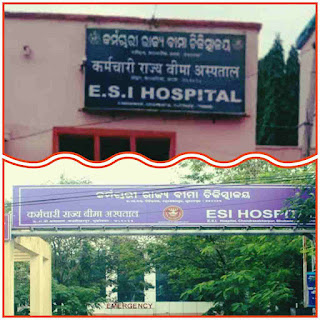ESI Scheme in Odisha: Understanding Eligibility and Benefits
 |
| ESI Scheme |
Understanding the ESI Scheme: A Comprehensive Guide
Introduction to ESI Scheme:
In this article, you will discover a comprehensive guide to the benefits offered under the ESI Act. From medical assistance to financial support, we'll explore the range of provisions available to insured persons (I.Ps.) and their families.
- The ESI Act of 1948 establishes a social insurance scheme to safeguard industrial workers' social security.
- It covers contingencies like sickness, maternity, disability, and employment injury-related death, ensuring full medical care for workers and their families.
Key Points about ESI Scheme:
1. Coverage Expansion: Initially launched in Kanpur and Delhi on 24th February 1952, it now extends to all states and Union Territories of India.
2. Benefits Provided:
- Sickness benefits
- Maternity benefits
- Disability benefits (temporary or permanent)
- Death benefits due to employment injury
3. Medical Care:
- Ensures comprehensive medical care for workers and their dependent family members.
4. Objective:
- To provide social security and financial protection to industrial workers during times of need.
5. Implementation:
- Governed by the Labour and Employment Department, Government of Odisha, the ESI Scheme ensures workers' welfare across the state.
Unlocking the Benefits of the ESI Act: A Comprehensive Guide
The Employees' State Insurance (ESI) Act(Scheme)offers a safety net for insured persons (I.Ps.) and their families, ensuring access to various essential benefits. Understanding these benefits is crucial for individuals seeking support during times of need.
1. ESI SCHEME~Medical Benefit:
- Access to outpatient and inpatient treatment at ESI Hospitals/Dispensaries, as well as referral hospitals.
- Consultation with specialists for specialized medical care.
- Provision of drugs, dressing, artificial limbs, and medical aids.
- Availability of investigation facilities for accurate diagnosis.
- Participation in National Health Programmes for broader healthcare coverage.
- Reimbursement of medical expenses incurred by I.P.s, including the cost of treatment.
- Issuance of medical certifications as required.
2. Sickness Benefit:
- Financial assistance during periods of illness, ensuring continued income for I.P.s.
3. Maternity Benefit:
4. Disablement Benefit:
- Compensation and assistance for I.P.s facing temporary or permanent disability due to work-related injuries or illnesses.
5. Dependant’s Benefit:
- Financial aid extended to dependents of deceased I.P.s, helping sustain their livelihood.
6. Funeral Benefit:
- Assistance provided to cover funeral expenses, easing the financial burden on the deceased's family.
ESI Scheme's Eligibility Criteria: Who Qualifies for Coverage under the ESI Act?
The ESI Act applies to certain types of businesses and establishments. Specifically, factories that operate year-round and have at least 10 employees if they use power, or 20 employees if they don't use power, must follow the rules of the ESI Act. Additionally, other businesses like shops, hotels, restaurants, cinemas, road transport agencies, and newspaper companies with 20 or more employees must also follow the ESI Act. All employees in these factories and establishments who earn up to Rs. 6500 per month are included under the Act, which means they are entitled to the benefits provided by the Act.
Conclusion:
The ESI Scheme stands as a pillar of support for employees and their families, offering a range of benefits to safeguard their health, financial stability, and overall well-being. By familiarizing themselves with these provisions, individuals can make informed decisions and access the assistance they deserve during challenging times.




0 Comments